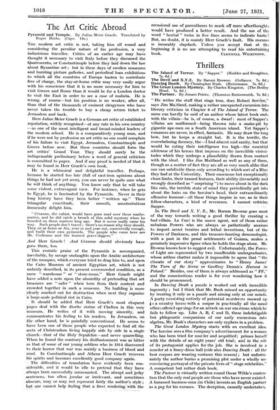The Art Critic Abroad
THE modern art critic is not, taking him all round and considering the peculiar nature of his profession, a very industrious traveller. Critics of an earlier age may have thought it necessary to visit Italy before they discussed the Quatrocento, or Constantinople before they laid down the law about Byzantine art ; but in these days of swollen museums and bursting picture galleries, and periodical loan exhibitions to which all the countries of Europe hasten to contribute free of charge, the stay-at-home critic may very easily argue with his conscience that it is no more necessary for him to visit Greece and Rome than it would be for a London doctor to visit the East in order to see a case of malaria. He is wrong, of course—but his position is no weaker, after all, than that of the thousands of eminent clergymen who have never taken the trouble to buy a cheap return ticket to Jerusalem and back.
Herr Julius Meier Graefe is a German art critic of established reputation, widely recognized—at any rate in his own country —as one of the most intelligent and broad-minded leaders of the modern school. He is a comparatively young man, and if he were not by profession an art critic no one could complain of his failure to visit Egypt, Jerusalem, Constantinople and Greece before now. But these countries should form the art critics' Grand Tour. They should surely be the indispensable preliminary before a word of general criticism is committed to paper. And if any proof is needed of that it may be found in Herr Graefe's own book.
He is a whimsical and delightful traveller. Perhaps, because he started too late (full of cast-iron opinions about things he had not yet seen), you can never be quite sure what he will think of anything. You know only that he will take some violent, extravagant view. For instance, when he gets to Egypt, he is fascinated by the Pyramids. Never in their long history have they been better " written up." Their triangular exactitude, their smooth, unostentatious immensity delight him.
" Cezanne, the cubist, would have gone mad over these mathe- matics, and he did catch a breath of this solid mystery when he brooded on these matters long ago. But it never really came his way. Such people don't travel ; there's no reason why they should. They sit at home at Aix, year in and year out, contentedly enough, and build their own pyramids. The people who come here are
Mr. Coolmans and the learned grave-diggers." .
And Herr Graefe ! And Cezanne should obviously have gone there, too.
This ecstatic praise of the Pyramids is accompanied, inevitably, by savage onslaughts upon the Arabic architecture of the mosques, which everyone tried to drag him to, and upon the Cairo Museum of ancient Egyptian art, which is not unfairly described, in its present overcrowded condition, as a mere " warehouse " or " store-room." Herr Graefe might have added a note upon the absUrdity of pretending that art treasures are " safer " when torn from their context and crowded together in such a museum. No building is more clearly marked out for destruction when next they organize 'a large-scale political riot in Cairo.
It . should be added that Herr Graefe's most eloquent pages deal with the diorite statue of Chefren in this very 'museum. He writes of it with moving sincerity, and communicates his feeling to his readers. In Jerusalem, on .tile other hand, he is painfully conventional. He seems to have been one of those people who expected to find all the
• sects of Christendom living happily side by side in a. single church—that of the Holy Sepulchre—and never quarrelling. When he found the contrary his disillusionment was as bitter as that of some of our young soldiers who in 1914 discovered to their horror that war was mainly a business of blood and mud. In Constantinople and Athens Herr Graefe recovers his spirits and becomes excellently good company again. The difficulties of translation have evidently been con-
siderable, and it would be idle to pretend that they have .always -been successfully surmounted. The abrupt and jerky .sentences,-: too often jocular or irrelevant, and sometimes _obscure, may_ or may_ not_ represent fairly the author's style ; but one cannot help feeling that a freer rendering, with the
occasional use of parentheses to mark off mere afterthoughts would have produced a better result. And the use of the word " bestial " twice in five lines seems to indicate haste ! But, no doubt, it is mainly Herr Graefe's fault. His manner is incurably slapdash. Unless you accept that at the beginning it is no use attempting to read his entertaining






































 Previous page
Previous page